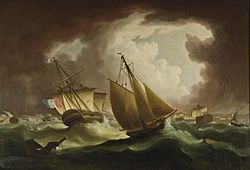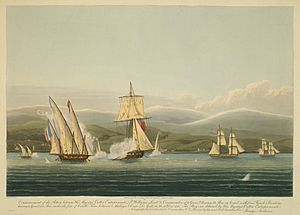HMS Entreprenante (1799) facts for kids

The Royal Navy armed cutter Entreprenante shadowing the remnants of the Franco-Spanish fleet as it runs into Cadiz after the disastrous defeat at Trafalgar, by Thomas Buttersworth
|
|
Quick facts for kids History |
|
|---|---|
| Name | Entreprenante |
| In service | 1797 |
| Fate | Captured by the British in 1798 |
| Name | HMS Entreprenante |
| Acquired | by capture 1798 |
| In service | Purchased November 1798 and registered 1 June 1799 |
| Honours and awards |
|
| Fate | Broken up in June 1812 |
| General characteristics | |
| Class and type | 10-gun cutter |
| Tons burthen | 12659⁄94 (bm) |
| Length | 67 ft (20.4 m) (overall), 51 ft 6 in (15.7 m) (keel) |
| Beam | 21+1⁄2 ft (6.6 m) |
| Draught | 9 ft (2.7 m) (unladen), 11 ft (3.4 m) (laden) |
| Propulsion | Sails |
| Complement | 40 |
| Armament |
|
HMS Entreprenante was a small but brave 10-gun ship. The Royal Navy captured her from the French in 1798. She was a type of ship called a cutter.
The British Navy used her during the French Revolutionary and Napoleonic Wars. She even took part in the famous Battle of Trafalgar. Entreprenante was the only ship in the Royal Navy to ever have this name. She was involved in many small battles. She captured Spanish and French ships before being taken apart in 1812.
Contents
Ship's Beginnings
Historians believe Entreprenante was built in France in 1797. She might have been a privateer (a private ship allowed to attack enemy ships) from a place called Socoa or Saint-Jean-de-Luz. Her first commander was Ensign Dominique Délouart.
Early Adventures
Entreprenante began her service with the British in February 1799. Lieutenant Charles Claridge was her first commander. Later, Lieutenant William Swiney took command in April.
In March 1800, Entreprenante helped capture a ship called Madona del Grazie. She also captured a Genoese ship carrying corn. She shared in the prize money from other captured ships, like the St. Rosalia and the Proteus.
In May, Entreprenante was part of a group of ships at the Siege of Genoa (1800). This was a big naval operation.
In January 1801, Entreprenante delivered important messages to Jaffa. Then, in March, she helped protect soldiers landing in Aboukir Bay. This was a key moment in a battle. Years later, her crew members could receive a special medal for their service in "Egypt."
Entreprenante was taken out of service in December 1802. She then spent time in Portsmouth getting repaired.
She was put back into service in December 1803. Lieutenant James Brown commanded her for a short time. On April 12, 1804, Lieutenant Robert Benjamin Young took over. In May 1805, Entreprenante and another ship captured a Prussian ship called Omnibus.
The Battle of Trafalgar
Entreprenante, led by Lieutenant Young, was at the Battle of Trafalgar on October 21, 1805. She was the smallest British warship there. She sailed with Vice-admiral Collingwood's division.
She did not fight directly in the main battle. But near the end, she helped rescue about 200 sailors. These sailors were from the French ship Achille, which had exploded.
Lieutenant Young also found the Spanish ship Bahama. Its Spanish crew had taken it back from the British. Young quickly sent a message to Collingwood. This helped the British get Bahama back and take her to Gibraltar.
After the battle, Entreprenante carried Collingwood's messages. These messages announced the great British victory. Her crew members who were still alive later received a special medal for "Trafalgar."
Watching the French Fleet
Still under Lieutenant Young, Entreprenante spent 1806 in the English Channel. She helped watch the French fleet near Brest, France. In April 1806, Lieutenant John Payer might have temporarily commanded her. By January 1807, Young was back in command.
In December 1808, Lieutenant Peter Williams took over. Entreprenante stayed with the Channel Fleet. On December 27, she recaptured a ship called Cora.
In May 1809, Entreprenante sailed to Portugal. In January 1810, she was in Pera. She picked up gifts for King George III. She sailed to the Mediterranean again in October 1810.
Exciting Action off Málaga
On December 12, 1810, Entreprenante was near the Spanish coast. She was stuck because there was no wind. Suddenly, four French privateer ships came out to attack her.
One French ship had eight guns and 75 men. Another had five guns and 45 men. The last two each had two guns and 25 men. Entreprenante only had 33 men on board.
The battle lasted for four hours. The French ships attacked from all sides. Entreprenante fought bravely. The French finally left, badly damaged. Entreprenante lost her topmast and had two guns broken. She also stopped three attempts by the French to board her. During this fight, one of her men was killed and ten were wounded.
Capturing the Saint Joseph
Entreprenante stayed near the Spanish coast in 1811. On April 22, she captured an American merchant ship called Hannah.
Her next big action was on April 25. Lieutenant Williams took Entreprenante into Málaga Bay. He was delivering a letter to the Governor. While there, they saw two French privateers. These were two of the ships Entreprenante had fought in December. They were escorting a captured ship.
Williams got a reply letter from the Governor. As Entreprenante left the harbor, he saw one privateer still moving. Williams attacked this privateer. After a quick 15-minute fight, Entreprenante drove the French ship onto the shore. It was badly damaged. This privateer had six guns and 50 men.
The water was getting too shallow for Entreprenante. So, Williams turned his ship. He then focused on the captured ship. After a few shots, he boarded it and took control. It was a Spanish ship called St. Joseph. It had been captured while sailing to Tarragona. Williams towed St. Joseph out of the harbor. Hundreds of people watched this exciting battle from the shore. Entreprenante did all this without any of her crew getting hurt! This was Entreprenante's last battle.
End of Service
Entreprenante arrived in Plymouth on March 22, 1812. She carried important messages from the Mediterranean. She was taken out of service in April 1812. Entreprenante was broken up in June 1812. She had served the Royal Navy bravely for over ten years.
 | Selma Burke |
 | Pauline Powell Burns |
 | Frederick J. Brown |
 | Robert Blackburn |


